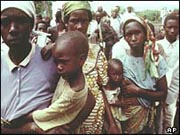Rwanda votes in second post-genocide parliamentary elections
 Nairobi/Kigali - Rwandans were set to vote Monday in the second parliamentary elections since the genocide that tore the country apart in 1994.
Nairobi/Kigali - Rwandans were set to vote Monday in the second parliamentary elections since the genocide that tore the country apart in 1994.
A coalition led by Paul Kagame's Rwandan Patriotic Front (FPR) is expected to romp to victory once more in a complicated election that will be monitored by a team of European Union election observers.
Rwanda has taken great strides since the 1994 massacre, when the Hutu militia and military massacred 800,000 Tutsis and moderate Hutus in the space of a few months.
The genocide came to an end when Tutsi-dominated FPR forces led by Kagame invaded Rwanda.
A transitional government took power until 2003, when Kagame - whom parliament made president in 2000 - scooped over 95 per cent of the vote to become the first democratically elected president since the genocide.
A coalition led by the FPR won the parliamentary elections held in the same year by a landslide.
Kagame's supporters say that he has helped Rwanda to stability and firm economic growth through reform, and indeed the World Bank last week said that Rwanda was the fastest reforming economy in the region.
However, opponents are critical of his authoritarian style and doubts were raised about the 2003 elections.
Opposition parties were banned until just before the elections, and bodies such as Amnesty International said that opposition politicians faced a campaign of "political pressure, violence and intimidation."
There is concern in some quarters that while opposition parties are now more tolerated, there is little chance of them ever being elected.
The EU has deployed over 50 observers and called for the elections to be conducted in a fair manner this time around.
"Successful and credible elections would be a positive contribution to the long-term democratic development of the country," EU Commissioner for External Relations Benita Ferrero-Waldner said.
Rwanda has an unusual election system that stretches over four days.
On Monday, 53 members of parliament will be elected using proportional representation. On Tuesday, 24 female MPs will be elected by provincial and city councils.
Two youth MPs will be elected on Wednesday by the National Youth Council and on Thursday one disabled MP will be elected by associations for the disabled.
The Rwandan Electoral Commission says that final results are not expected until 10 days after the election begins. However, the EU observer team said it would reveal its initial findings on Wednesday. (dpa)